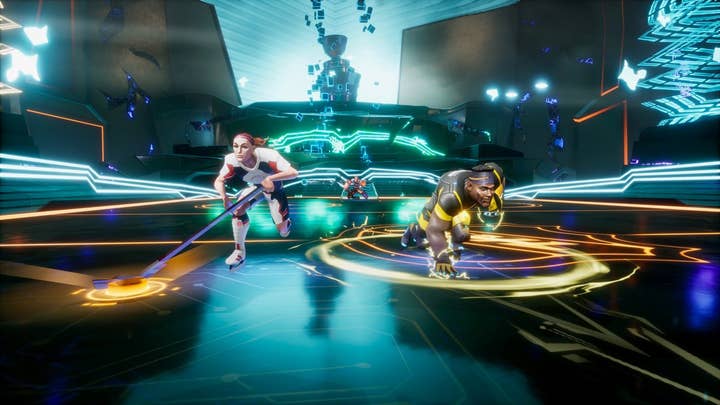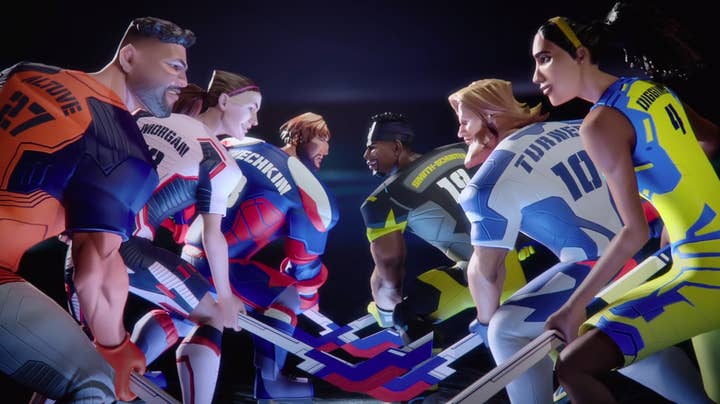Putting together an All-Star team of sports licenses
Bit Fry's Ben Freidlin talks about how and why the first-time developer got the NHL, NBA, MLB, WNBA, NFL Players Association and more on board for Ultimate Rivals
A little over six years ago, Bit Fry CEO Ben Freidlin founded the New Hampshire-based development studio to make an unlicensed arcade-style baseball game set in the 1920s. In December, the studio launched its first game, Ultimate Rivals: The Rink, as an Apple Arcade exclusive.
As the name implies, Ultimate Rivals: The Rink is a hockey game rather than a baseball game. It's set in a sci-fi future rather than the past. And it's about as far from unlicensed as you can get.
Naturally, it has the licenses for both the National Hockey League and the National Hockey League Players Association. In an act of thoroughness, Bit Fry also secured the individual license of retired legend Wayne Gretzky. And in a move we can only describe as coming from left field, Ultimate Rivals: The Rink also features licenses from Major League Baseball, the Major League Baseball Players Association, the National Basketball Association, the National Basketball Players Association, the Women's National Basketball Players Association, the US Women's National Team Players Association (soccer), and the National Football League Players Association. (The NFL itself remains on the sidelines of this licensing throwdown.)
The result is a game with 58 pro athletes from across those leagues bearing their proper likenesses (and official team logos where possible), all lacing up skates to go head-to-head in fast-paced games of two-on-two hockey. And because it wouldn't be proper to give the Gretzkys of the world a permanent home ice advantage, the Ultimate Rivals franchise will expand to bring its cadres of superstars to other sports in the near future, beginning with basketball and Ultimate Rivals: The Court later this year.
Speaking with GamesIndustry.biz, Freidlin says Ultimate Rivals isn't so far apart from that unlicensed vintage-era baseball game the studio was formed to create.
"The thesis really hasn't changed," he says. "I feel like a lot of the sports games I grew up playing -- Blades of Steel, Baseball Stars, Tecmo Bowl, NBA Jam, and Blitz -- nearly all of them had left the market. We've got some really amazing simulation games and it's phenomenal what they're able to do, but I saw an opportunity [in arcade-style sports]. And personally, I just wanted to play those games again."
As for what led to the studio's historical baseball project being shelved in favor of Ultimate Rivals, Freidlin called it a case of "evolving opportunities" that would likely be familiar to many entrepreneurs.
"Over time you learn what the market is really interested in, and that helps define what you end up building," Freidlin says. "I think the core version is really still there -- accessible, fun, focused, high-speed, twitch controls, smooth frame rate -- but the underlying intellectual property opportunities that expanded in the pursuit of that initial vision continued to develop."
"[People] immediately identify with the underlying athletes, the teams, and the leagues. That's something you can't really create with original intellectual property in the sports category"
Freidlin acknowledges that the potential market for a licensed sports game presented a greater opportunity than an unlicensed one, but prefers to look at the decision to shift development from the old time baseball game to Ultimate Rivals as one based on the positive opportunity of a licensed game rather than the limitations of an unlicensed one.
"Having licenses, you obviously have a greater degree of immediate addressable market," Freidlin says. "You have consumers who immediately identify with the underlying athletes, the teams, and the leagues. That's something you can't really create with original intellectual property in the sports category. It's certainly difficult compared to other categories like RPGs where people are maybe looking for the next story, pantheon, or universe to be developed. You get a lot more existing material, and you also create a longer-term potential for a perennial title and a franchise that develops, which is tough to do in sports without the intellectual property."
As for how a first-time developer at a first-time studio managed to strike deals to the satisfaction of so many licensors, Freidlin declines to get into specifics about how the deals came together.
"You start out as an independent developer and you never think you'll have the chance to have those licenses," Freidlin says. "But as you further develop the vision, the differentiators in the actual gameplay, and develop the team, some of those opportunities open up and you see that as positive, forward-looking potential and you capitalize on that and grow the vision around it."
Of course, connections always help, and Bit Fry has made plenty of those. The first investment in Bit Fry was made by former Boston Red Sox owner and vice chairman Les Otten, and its backers have also included late NBA Commissioner David Stern (who Freidlin called "one of the most instrumental people" in getting the studio where it is), retired MLB all-star Ryan Howard, Dugout Ventures (a VC firm affiliated with a host of ex-MLB stars), and others well connected in the world of sports. And it's not like the connected names are limited to just the money behind the scenes, as retired MLB journeyman Todd Zeile has been with Bit Fry for four years now and serves as the studio's chief business development officer.
"We're definitely in the mash-up era"
The crossover concept of Ultimate Rivals is also something large brands such as these sports leagues have grown more comfortable with, and something fans have more frequently called for.
"I think we're living in a day and age where consumers increasingly want to be able to define their own experiences with their personal time when they engage in commercial art, whether it's comic book crossovers, music collaborations, or even fashion collaborations," Freidlin says. "We're definitely in the mash-up era.
"So it's somewhat a matter of timing that's always contributing to opportunities and you have to recognize that. But we did have the vision I think a lot of us had as sports fans growing up, talking with friends, or listening to sports radio. You would have debates about who was the better baseball player: Babe Ruth or Derek Jeter? What are the differences in eras between sports? Then you look around and see Russell Wilson taking batting practice at Yankee Stadium, or Carli Lloyd being discussed as the potential first female NFL player as a kicker, or what would LeBron James do as a tight end in the NFL, and so on. I grew up in the era of Bo Jackson and Deion Sanders, so the idea of crossover athletes became a reality at an incredibly high level of performance with those two."
As much as Ultimate Rivals' cornucopia of licenses helps it stand out, Freidlin doesn't think it would have been possible if Bit Fry didn't have a product worthy of it.

"What got us here is the uniqueness of the vision and bringing back arcade action sports in a big way," he says. "That's a big bite of a market that's been almost neglected for various market dynamic reasons that are not easily listed. But we ended up here 20 or 30 years later without too many of these games."
"The ethos of this company is not to create games that have mercurial costs to them"
He acknowledges a slight resurgence of the genre in recent years, citing Rocket League as one example, but believes more can be done in modernizing these kinds of games.
"If arcade action sports games are about deconstructing the sport and putting it in tight, fast game loops, what's the next evolution of that? How can we go forward and not just take proven methods in game loops from the past -- which I think we were all missing -- but innovate on that and create a product that's not just a nod from a retro standpoint, but really sets up a new franchise that has the potential to define a whole new category?"
As tempting as it is to hear someone talk about innovating in a neglected genre and think that innovation might involve stapling modern business models on them, don't expect Ultimate Rivals to resort to Ultimate Team-style monetization schemes.
"Personally, I'm old enough to come from an era where you could count, or at least deterministically know, what it would cost to fully experience the game," Freidlin says. "And I'm a big believer in that concept... The ethos of this company is not to create games that have mercurial costs to them. I don't want to sit here and say definitively it's going to be X dollars and that's the end of it. But I am comfortable saying it's going to feel a lot closer to that kind of game for consumers than an open-ended free-to-play grind game where you're paying to win or there is an endless number of things you can pay for and never have any finality around it."
Ultimate Rivals' DLC strategy isn't the only bit of Bit Fry's future that Freidlin tip-toes around. When asked if he'd ever go back to the game idea that got the studio started in the first place, Freidlin teased that there were no guarantees, but added "I still have a strong desire and intention to deliver a period piece baseball game, and possibly one that even has a license involved with it."
Correction: This article originally stated that Bit Fry was based in New York. It has a New York City office, but is based in New Hampshire.


